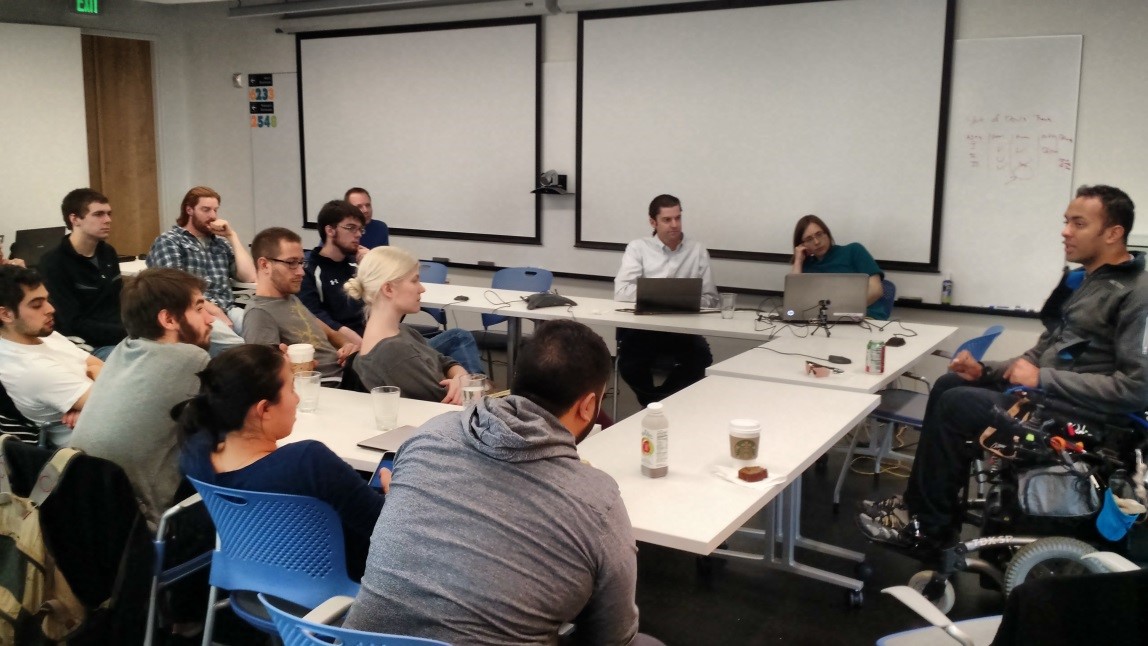 Imagine being asked to solve a problem for someone who you've never met. You have the necessary skills, you've been given a detailed overview of the issues at-hand, and you understand what's at stake; however, you never have actually met anybody with the problem you're trying to solve. Given enough time and information, you might come up with an effective means of solving the problem, but it would be very difficult to anticipate all of the potential impacts of your solution.
Imagine being asked to solve a problem for someone who you've never met. You have the necessary skills, you've been given a detailed overview of the issues at-hand, and you understand what's at stake; however, you never have actually met anybody with the problem you're trying to solve. Given enough time and information, you might come up with an effective means of solving the problem, but it would be very difficult to anticipate all of the potential impacts of your solution.
This scenario may sound far-fetched, but neural engineers sometimes find themselves in a similar position. They work on problems that they know need solving, such as developing better implants for Deep Brain Stimulation (DBS), but they may not fully understand the down-stream effects of the solutions they come up with. Specifically, what will the impacts of the assistive devices they develop be on end-users of those devices and their families?
Because the CSNE (Center for Sensorimotor Neural Engineering) focuses on health-science engineering, interactions with people who will be intimately involved in prescribing or using various types of assistive devices on a day-to-day basis, are critical to the education of students at the center.
As Dr. Lise Johnson, the CSNE University Education Manager, puts it, "I think engineers sometimes have a tendency to engineer into a vacuum. They think of a problem that needs solving, and then they imagine what they would want if they were that person. They engineer towards the specified goal, but they don't always realize that's not necessarily what people want. They may not have an accurate picture of what it's like to be a person with that particular condition or disability. For example, issues of comfort and ease-of-use are the kinds of things engineers tend to overlook. They also tend to overlook issues related to why a physician or practitioner might recommend one assistive device over another. There are also many insurance-related and historical factors at play that most engineers have little to no experience with or way of knowing about without someone coming in and talking about it."
To help address this knowledge gap, the CSNE is providing a vital forum for its students and faculty to converse directly with, and learn from, health-care practitioners and end-users of neurotechnology. The Practitioner and End-User Roundtable, facilitated by Dr. Johnson and hosted by the CSNE, aims to create a space for these important conversations.
The discussions at this monthly roundtable are designed to be informal in order to encourage conversation and brainstorming. The guest speaker is asked to give a 10 minute background talk about themselves, the unmet needs that they see within the field and the barriers they perceive to the adoption of new technologies. Students are then free to ask questions and engage in a dialogue about these topic areas.
As straightforward as this forum sounds, opportunities for engineering students to engage in this kind of direct conversation with health-care practitioners and technology end-users are actually quite unique and limited.
As Dr. Johnson states, "The roundtable is one of the things I'm happiest with, as part of the education programming we’ve done at the CSNE, because I've heard that it makes a big difference for students who come to them. I just think that opportunities to talk with people who have the disability that you're trying to help are rare...surprisingly rare. I'm very happy that we're able to provide this opportunity for students."
The most recent Practitioner and End-User Roundtable, held on May 3, featured guest speaker Dr. Claire Creutzfeldt, University of Washington Assistant Professor of Neurology and Attending Neurologist at Harborview Medical Center. Dr. Creutzfeldt spoke about her work in neuro-palliative care, helping patients who have undergone a stroke or other severe acute brain injury. She then took questions from students and engaged in a conversation centered mostly on care for stroke patients and how technology could help assist their recovery and treatment.
Featured speakers at roundtables rotate between a diverse set of health-care practitioners and technology end-users, helping to expose students to a range of points-of-view. According to student feedback, the conversations, especially with technology end-users, can be quite impactful.
As a research intern at a previous roundtable commented, "Seeing the end-user and hearing the other side of the story makes you think how you can contribute to it...and advance it in some sort of a way. It was nice to hear his perspectives and hear what his daily challenges are and anyone who is paralyzed—what their challenges are—so when you have a research project it is geared to what they want and not what you think they want."
The next Practitioner and End-User Roundtable is scheduled to be held in June at the CSNE. For more information, please contact Dr. Lise Johnson.
